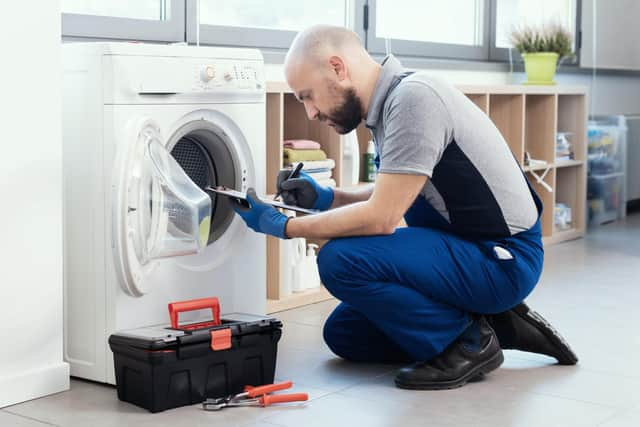Right to Repair is a game changer for white goods that go on the blink - Martyn James
To be honest the machine had a good run for its money, lasting well over ten years. Truly it’s the end of an era. Of course, I’m far, far outside of my warranty and the machine is so old making a claim on my content’s insurance wouldn’t be worth it.
But what about repairs? After all, there are mountains of electrical, white or ‘wet’ goods clogging up the land. Approximately 1.5 million tonnes of electrical waste get dumped each year. Unfortunately white goods like washing machines and dryers that are over two years old can be virtually impossible to repair.
Advertisement
Hide AdAdvertisement
Hide AdThat’s why the ‘right to repair’ law was introduced, which brings us in line with the EU’s similar legislation. Here’s how it works.


The Right to Repair states that spare parts must be available for appliances like washing machines, fridges and other white goods for up to ten years after purchase. It also applies to things like lighting and televisions – but not to others like smart phones or other tech devices. The rules only apply for items bought on or after 1 July 2021.
The driving factor behind the law is to make the things we use eco-friendlier and is part of a wider approach to electrical products. The rules also mean that things like washing machines have to be accessible for repairs too, rather than sealed in such a way you can’t get to key components. As with my dearly departed washing machine, it’s incredibly difficult to get inside some electronic items to make the repairs, which meant perfectly good items were disposed of rather than repaired.
As with everything, there are caveats. You’ll have to pay for the repairs unless you are covered by a warranty or guarantee. In the past this was prohibitively expensive. However, the new rules mean manufacturers must make sure that the goods have to be fixable using ‘commonly-available tools and without damaging the product’. They also have to make sure that spare parts and replacement bits are available to ‘professional’ repairers.
Of course, you do have a number of rights already if your goods pack in, depending on when that happens and why.
The Consumer Rights Act gives you the bulk of your shopping rights. The act covers goods and services and whether they are ‘satisfactory quality, as described or fit for purpose’. If the goods you buy don’t fit into these categories you can seek a refund, replacement or repair depending on when things go wrong.
If the item was bought online or on the phone then you have 14 days to return it under the Consumer Contract Regulations 2013. In-store is different though and will depend on the shop’s policy.
The rules say that you have 30 days from the date the goods were purchased to return the item if it’s wonky or isn’t as it was described. You’re entitled to a full refund if the goods are returned within 30 days.
Advertisement
Hide AdAdvertisement
Hide AdIf goods are faulty you have up to six months to return the items – and the burden of proof is on the retailer to prove the item wasn’t faulty or refund you. They are allowed to have one crack at a repair or replacing the item, but after that, you can ask for a refund.
In recent years, teetering towers of fridges and washing machines have pricked at the conscience of many people. So the new rules should go so way towards turning back the tide on electronic waste. If goods covered by the new law do pack in, then shop around to find the best quote for the repairs. There are a range of websites bringing together local tradespeople or sharing recommendations for businesses. If you find someone who provides a great service, make sure you recommend them!
Martyn James is a leading consumer rights campaigner, TV and radio broadcaster and journalist.
Comments
Want to join the conversation? Please or to comment on this article.